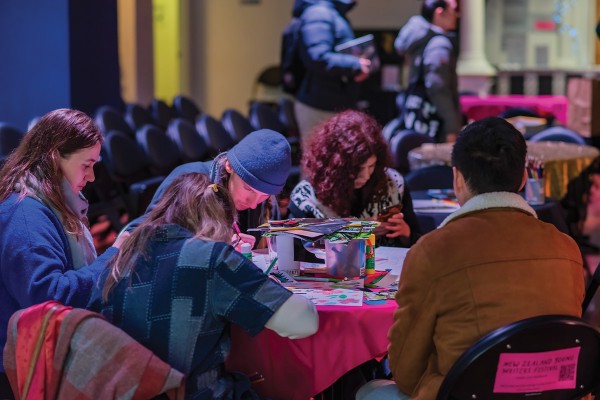Back for its 10th year, Ōtepoti will be hosting the New Zealand Young Writers Festival on September 13-15th, a (free) three-day festival produced by Dunedin Fringe. This year’s program, which dropped last Wednesday, is packed with a diverse range of panel discussions, workshops and performances – including appearances from your local journos at Radio One and Critic Te Ārohi (shameless self-promo).
Critic Te Ārohi spoke to Lil della Porta, the marketing manager for the festival and ex-journo herself. “It’s celebrating the brightest young minds in New Zealand, and is by young writers, for young writers,” Lil said of the festival. “A lot of the people who work on it – including me – are also young people in the creative industry, so we’re creating the thing for young people and we’re also doing it inside the organisation which is a big part of why I love working on it. It’s like really the heart, you know?”
Contrary to what you might think, attending the festival won’t mean doing a whole bunch of reading – you’ve got enough of that in your degree. Lil said that they take a “broad view” of writing in the festival. “There’a whole range of content, it’s really vast [...] we often have musical content.” The festival is open to anyone from 15 to 35 who can take part either as a presenter or an artist in the program that has been guest curated by Ruby Macomber, freelance poet, essayist and researcher.
One of the biggest events this year, according to Lil, will be New Zealand playwright Nathan Joe’s ‘Dirty Passports’ that has been performed across the motu. Nathan calls the show “minorities behaving badly.” Lil said of the show, “It will be a really awesome, high calibre panel of writers just really having a good time talking about their experiences as minorities in New Zealand. And it’s very tongue and cheek.” As such a highly reviewed piece, Lil said that they’re “stoked” to have ‘Dirty Passports’ on the program, anticipating that it’ll be a draw card for students.
An important aspect of the festival’s kaupapa is accessibility. “We are really committed to championing BIPOC, Māori and Pasifika voices, and we make a big effort to include [and] make it accessible to everybody,” said Lil. Part of this is the price – or lack thereof. This year, they’re introducing a “pay what you want” policy.
Of the payment policy, Lil said, “From my perspective, I’m like boomers, come through [...] Like, if you're coming and you're supporting young people and you wanna see this continue, then please pay some money. You'll probably own like three houses and you can afford it. And then like the homies who can't like [...] if you're like a student and you don't have the money, then don't do it. But it's there for the people that can and want to, which is cool ‘cos we rely on our sponsors and our donations really to continue the festival.”
“This is an open space where people are going to be talking about that, you know? We are all young people who are in the creative community who are first hand witnessing the difficulties of trying to get ahead or continue to do the things that we're doing – even this festival. It all relied on support for the arts and cultural communities in New Zealand. And so, this is a really awesome space to be able to have those kinds of conversations and to encourage each other, ‘cos we have to keep going. If we stop doing it, if we stop meeting, if we stop turning up to events like this, then they won't happen. And then we have a big loss.”
One event was submitted by Jamiema, current Radio One News Producer and a former Critic writer, who has now been involved with the festival for three years running. Jamiema, alongside Critic Editor Nina and Pantograph Punch Kaiwāwahi Editor, will be in a panel discussion on ‘Journalism as An Act of Community Building’, a topic inspired by her time working for Critic: “We were always writing such wacky stories or writing about really niche communities [...] it’s kind of just encouraging people to pursue those [stories] and thinking about what communities [you’re] connected to.”
A stand-out piece from last year’s festival for Jamiema was a panel called ‘I Shouldn’t Have Read That’ of five writers talking about stumbling upon “writing that was a bit too saucy” in their early teens – one for everyone who’s innocence was lost in the Wattpad era (you know who you are). “It was just funny to hear from all these people on a formal space talk about reading fanfiction at like the age of 14,” laughed Jamiema.
Another of Jamiema’s favourites was a panel called ‘I’m Not An Imposter’ put together by another former Critic writer, alongside three other women of colour talking about imposter syndrome entering the writing world, an historically white male-dominated space, and how they coped with that. “So I think [those] two very contrasting important events kind of show the diversity of the content that will be on offer,” said Jamiema.
Audiences of all ages are invited to book tickets. If you’re feeling shy, Lil said all the writers involved are “really lovely people and are here because they care about this kaupapa, and they really care about this community. There’s nobody that, in my view, can turn up and not feel part of it.”
You can book tickets through their website (www.youngwritersfest.nz). Lil encouraged getting in early for these: “They do sell out and there’s things that are quite limited."



